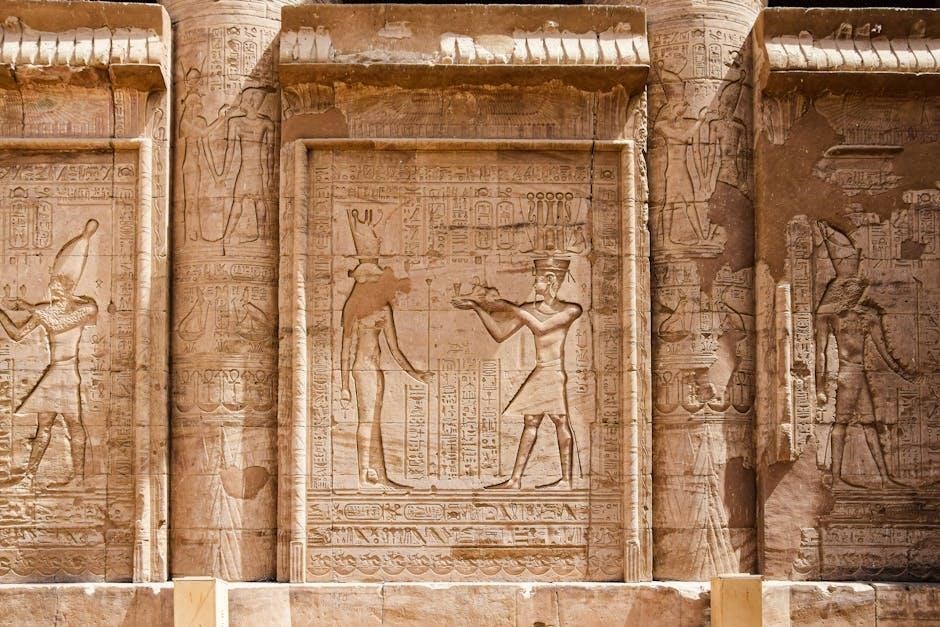The Wicked musical, based on Gregory Maguire’s novel, reimagines the Wizard of Oz story from the witches’ perspective, blending stunning music and profound themes of friendship and prejudice.
Overview of the Musical and Its Popularity
Wicked is a global phenomenon, captivating audiences with its poignant story and unforgettable music. Based on Gregory Maguire’s novel, it offers a fresh perspective on Oz, exploring the untold story of the witches. The musical, created by Winnie Holzman and Stephen Schwartz, features iconic songs like “Defying Gravity” and “Popular.” Its themes of friendship, prejudice, and self-discovery resonate universally, making it a beloved and critically acclaimed production worldwide. Its enduring popularity has solidified its place as one of the most successful musicals in history.
Importance of the Wicked Script in Musical Theater
The Wicked script stands as a landmark in musical theater, blending complex characters with rich storytelling. Its exploration of morality, friendship, and prejudice offers depth, making it a study staple. The collaboration between Winnie Holzman and Stephen Schwartz created a narrative that challenges perspectives, while its musical themes enhance emotional impact. Available as a PDF, the script is widely used for academic analysis, providing insights into character development and thematic resonance, cementing its significance in both education and theatrical history.
Background and Creation of Wicked
Wicked was adapted from Gregory Maguire’s novel, with Winnie Holzman and Stephen Schwartz collaborating on the script and music. The musical took over a year to develop, blending a fresh narrative with memorable songs, and is now available as a PDF for study and analysis.
Adaptation from the Novel “Wicked: The Life and Times of the Wicked Witch of the West”
Gregory Maguire’s novel was the inspiration for the musical, offering a fresh perspective on the witches’ lives. Winnie Holzman and Stephen Schwartz collaborated to adapt the story into a script, capturing its complexity and depth. The adaptation retains the novel’s core themes of friendship, prejudice, and morality, while adding musical elements that enhance the narrative. The Wicked script PDF reflects this adaptation, providing a detailed look at the dialogue, songs, and stage directions that bring the story to life. It is widely used for analysis and educational purposes.
Collaboration Between Winnie Holzman and Stephen Schwartz
The creation of Wicked was a result of the close collaboration between Winnie Holzman and Stephen Schwartz. They spent a year developing the musical’s outline before beginning work on the script and songs. Their teamwork ensured a seamless blend of Holzman’s storytelling and Schwartz’s iconic music. The partnership brought depth to the characters and themes, creating a captivating narrative. Their collaborative effort is evident in the Wicked script PDF, which showcases their artistic vision and storytelling prowess.

Main Characters in the Wicked Script
The Wicked script centers around two iconic witches, Elphaba (the Wicked Witch of the West) and Galinda (the Good Witch of the North), exploring their complex friendship and contrasting personalities.
Elphaba: The Wicked Witch of the West
Elphaba, the misunderstood Wicked Witch, captivates audiences with her striking green skin and fiery spirit. Her journey from an outcast student at Shiz University to a powerful witch highlights her struggle with prejudice and societal expectations. Through her transformation, Elphaba’s complexity shines, revealing a deep sense of morality and loyalty. Her iconic song “Defying Gravity” symbolizes her defiance and self-empowerment, making her one of the most compelling characters in musical theater history.
Galinda: The Good Witch of the North
Galinda, the captivating and popular witch, initially appears as a self-centered, vain character who contrasts sharply with Elphaba. Her journey reveals a deeper side, showcasing her growth from superficiality to genuine friendship and empathy. With her charm and wit, Galinda navigates the complexities of Shiz University and her eventual role as the “Good Witch of the North.” Her dynamic relationship with Elphaba forms the heart of the story, highlighting themes of rivalry, misunderstanding, and ultimate reconciliation.
Key Musical Numbers in the Script
The Wicked musical features iconic songs like “Defying Gravity” and “Popular,” which captivate audiences with their powerful melodies and meaningful lyrics, driving the plot and character development forward.
Iconic Songs Like “Defying Gravity” and “Popular”
The Wicked musical is renowned for its unforgettable songs, with “Defying Gravity” and “Popular” standing out as fan favorites. “Defying Gravity” captures Elphaba’s defiance and transformation, while “Popular” humorously highlights Galinda’s shallow yet endearing personality. These tracks, composed by Stephen Schwartz, not only advance the plot but also resonate deeply with audiences, exploring themes of identity and societal expectations. Their catchy melodies and poignant lyrics have cemented their places as modern musical theater classics, making them indispensable to the Wicked experience.
Analysis of Musical Themes and Lyrics
The Wicked script delves into profound themes through its lyrics, exploring prejudice, friendship, and morality. Stephen Schwartz’s compositions, like “Defying Gravity” and “Popular”, not only showcase musical brilliance but also reflect the characters’ emotional journeys. The collaboration between Winnie Holzman and Schwartz ensures that the lyrics are deeply intertwined with the narrative, offering insights into Elphaba and Galinda’s complexities. The songs often serve as commentary on societal expectations and self-discovery, resonating emotionally with audiences and enhancing the musical’s layered storytelling.

Structure of the Wicked Script
The Wicked script is divided into two acts, with Act 1 focusing on character introductions and setup, while Act 2 drives the plot toward its dramatic conclusion.
Act 1: Setup and Character Development
Act 1 introduces the main characters, Elphaba and Galinda, as they meet at Shiz University. Their contrasting personalities—Elphaba’s introverted uniqueness and Galinda’s outgoing popularity—set the stage for their complex relationship. The act establishes the world of Oz, its magical education system, and the arrival of Fiyero, a carefree prince whose charm immediately captivates Galinda. Through their interactions, the script lays the groundwork for themes of prejudice, friendship, and societal expectations, while hinting at the broader political tensions in Oz.
Act 2: Plot Development and Climax
Act 2 delves into the escalating tensions and transformative events in Oz. Elphaba’s defiance of the Wizard’s rule intensifies, leading to her eventual public condemnation as the “Wicked Witch.” Meanwhile, Galinda’s rise to prominence as the “Good Witch” strains her relationship with Elphaba. The act explores Fiyero’s growing allegiance to Elphaba and the tragic confrontation at the Wizard’s palace. The climax reveals the Wizard’s manipulation and Elphaba’s ultimate sacrifice, leaving a shattered Oz and a legacy of misunderstanding, with the musical concluding on a poignant note of lost potential and enduring friendship.
Themes and Messages in the Script
The Wicked script explores themes of prejudice, friendship, and morality, offering political and social commentary while challenging stereotypes and questioning moral ambiguity in Oz.
Exploration of Prejudice, Friendship, and Morality
The Wicked script delves into themes of prejudice through Elphaba’s mistreatment due to her green skin, highlighting societal biases. Friendship is central, as Elphaba and Galinda navigate their complex bond despite differences. Morality is explored through their moral dilemmas, challenging the notion of “good” and “evil.” The story encourages empathy and self-reflection, showing how misunderstandings and fear can lead to prejudice. These themes resonate deeply, making Wicked a powerful exploration of human nature and societal issues.
Political and Social Commentary
The Wicked script offers sharp commentary on power dynamics and propaganda, as seen in the Wizard’s authoritarian regime. Elphaba’s journey critiques systemic oppression and the marginalization of the “other.” The musical reflects on societal hierarchies, with Oz’s elite contrasting with the oppressed. Themes of control and manipulation highlight the dangers of unchecked power, while Elphaba’s resistance symbolizes the fight for justice and equality. These elements make Wicked a compelling allegory for real-world political and social struggles.

Where to Find the Wicked Script PDF
Authorized sources offer the Wicked script PDF for download, ensuring legality and quality. Fans can access it through official theaters or licensed platforms, supporting creators ethically;
Official Sources and Licensed Downloads
To obtain the Wicked script legally, visit official sources like the musical’s website or licensed platforms. These provide high-quality PDF downloads, ensuring compliance with copyright laws. Authorized theaters and distributors often offer access to the full libretto, supporting the creators. Downloading from reputable sites guarantees an authentic and complete version of the script, ideal for analysis or educational use. This method also helps avoid unauthorized or incomplete versions, ensuring the best experience for fans and scholars alike.
Free PDF Downloads and Reader Requirements
Free Wicked script PDFs are available online, though many are incomplete or contain only Act 1. These unofficial versions may lack the full libretto or include typos. For a complete experience, ensure the script is verified and closer to the original. Some free downloads claim to be authentic but may not match the official version. Always check for typos and inconsistencies before use.
To view PDF scripts, a reliable PDF reader is essential. Downloading a trusted reader ensures compatibility and proper formatting, enhancing readability for analysis or performance purposes.

Analysis and Educational Use of the Script
The Wicked script is widely used in schools for analysis, exploring themes like prejudice and friendship. Its rich dialogue and musical elements make it ideal for educational projects.
Using the Script for School Projects and Analysis
The Wicked script is a valuable resource for educational projects, enabling students to explore complex characters, themes, and musical elements. Its rich dialogue and moral dilemmas make it ideal for literary analysis. Schools often use the script to teach drama, ethics, and storytelling techniques. Additionally, the musical’s themes of prejudice, friendship, and power provide deeper insights for academic discussions. By analyzing the script, students can gain a comprehensive understanding of both the story and its cultural significance, making it a popular choice for school assignments and theatrical studies.
Themes and Elements for Academic Study
The Wicked script offers a wealth of academic study material through its exploration of morality, identity, and societal judgment. Themes like prejudice and friendship are central, while political undertones provide layers for analysis. The musical’s use of symbolism and character development adds depth, making it a prime subject for examining narrative structure and emotional resonance. The interplay between music and dialogue further enriches its academic value, allowing scholars to dissect how both elements convey the story’s message and emotional complexity. This makes the script a dynamic tool for interdisciplinary studies in theater, literature, and cultural critique.
The Wicked script remains a cultural phenomenon, impacting musical theater and education. Its themes and music continue to inspire academic analysis and artistic appreciation worldwide.
Impact of the Wicked Script on Musical Theater
Wicked revolutionized musical theater by reimagining classic narratives and exploring complex themes. Its innovative storytelling and emotional depth have influenced modern musicals, inspiring creators to adopt fresh perspectives. The collaboration between Winnie Holzman and Stephen Schwartz set a new standard for musical storytelling, blending compelling characters with memorable music. The script’s success has made it a benchmark for contemporary theater, proving that reimagined tales can captivate global audiences and spark meaningful conversations about identity, morality, and societal norms.
Final Thoughts on Its Cultural Significance
Wicked has left an indelible mark on culture, challenging perceptions and fostering empathy through its exploration of misunderstood characters. Its themes of prejudice, friendship, and self-discovery resonate universally, making it a timeless work. The musical’s ability to connect with diverse audiences has solidified its place in theatrical history, while its script continues to inspire academic analysis and artistic adaptation. As a cultural phenomenon, Wicked remains a powerful reminder of the transformative impact of storytelling in society.
